is this foreplay 😉?
+ a brief exploration into why we read/why we write? ++ "the most fun I've had writing in a long time" +++ a dreamy new cookbook and what you must make for your friends
hey-ho!
Happy August! I’m shaking up the newsletter a little bit. Up top I’m sharing an exploration into why we read and why we write. I’ve also got a terrific, not to be missed recipe for you from a new cookbook I’m loving. And I’m still promoting THE GOD OF THE WOODS as one of the best books I’ve read in a long time. I raced through the last 150 pages! (Do join in for our zoom book group). And, from the writer Aimee Bender, a story recommendation as well as a not to be missed prompt. When I recently shared it with a writing pal she afterward told me:
“This is the most fun I’ve had writing in a long time!”
Thank you for being here each and every week. It’s a joy for me to share what I’m loving, what I’m thinking about, and what I’m eating! (Oh, and hooray new subscribers… welcome! )
But first:
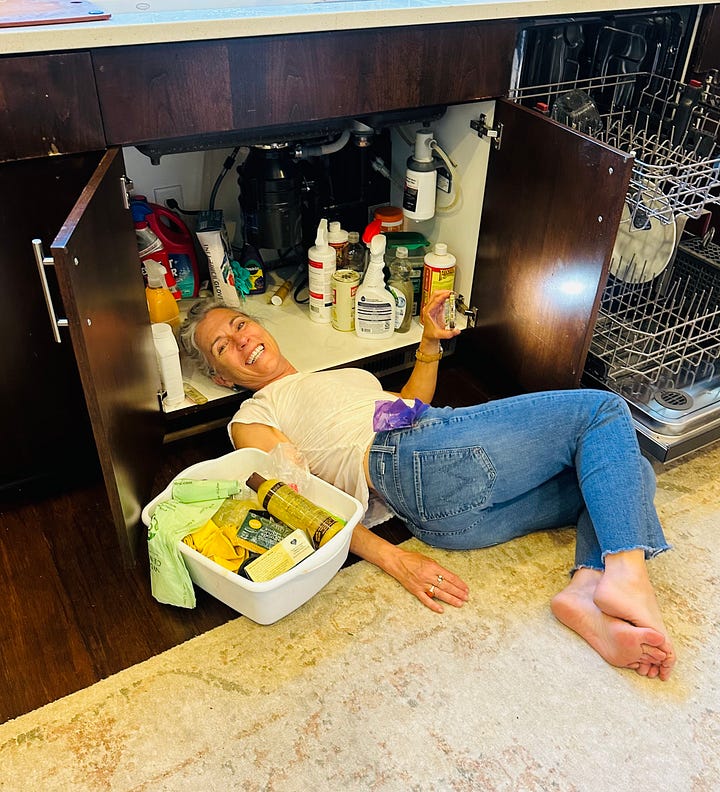
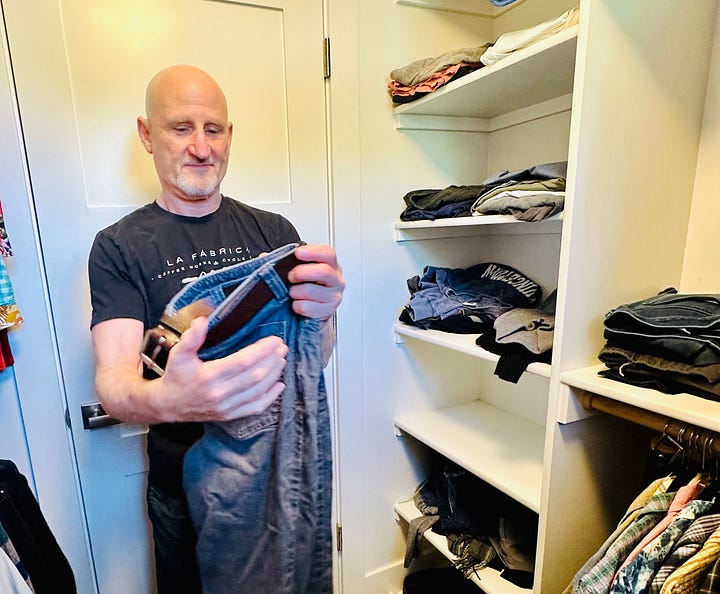
Of course the garbage disposal quit in the middle of a dinner party. Positioned beneath the sink as the in-house plumber, I heard my husband say to a guest, “I married well!” He was delighted with me! I don’t know, felt pretty transactional… just saying.
The next day we had a meeting with our tax advisor and my husband… let’s just say he hoards raggedy old t-shirts has no compunction wearing threadbare relics. Imagine my delight and love when, with just a little nudging, I later found him Marie Kondo-ing his closet!
Thirty-six years together, and lo! So many ways to please each other!
What’s your love language?
I hope my newsletter, pleases you. Books to read. A writing prompt if you’re into it. A recipe. A cute dog! Boom! Here’s to the small things that lift us up. Only 1.25 a week! Such a deal.
read & write:
Why I Read, Why I Write - an exploration
All summer long on Cayuga Street a raggedy sheet hung over the clothesline that connected the garage to our tiny house, making our backyard private enough for topless sunbathing. Most Saturday afternoons my mother lounged on a chair, skin slicked with coconut oil, drinking tequila and orange juice. At thirteen I still enjoyed being in her company. If I wasn’t at the beach with my friends, I might drag out a tall backed dining room chair and sit beside her. Our yard was just a patch of cracked cement bordered with aphid covered weeds whose leaves I pinched, staining my fingers green.
My mom liked me to read aloud to her while she balanced a foil reflector on her stomach, bouncing the sun back onto her face. She handed me her novel, Even Cowgirls Get the Blues, by Tom Robbins. I remember pretty much nothing from the book. Someone had a giant thumb and was hitchhiking somewhere. The novel was saucy. I felt like a grown-up, reading to my mom, something we’d been doing together since I was a child and she read me Winnie the Pooh.
On this day she was happy. Her good mood infected me. My mom didn’t make a person feel good because you felt seen or understood or appreciated and recognized for your sparkle. My mom made you feel good by choosing to scatter her sparkle around you. “Read it again,” she would say about a funny line, trilling her laugh, like expensive desert spoons rattling in a silverware drawer.
“Read it again,” she would say about a funny line, trilling her laugh, like expensive desert spoons rattling in a silverware drawer.
I came upon the word, chihuahua. I had no idea how to say it or what it was. I am not certain how I missed the context, but what I read aloud was: Chi-hoo-ah-hoo-ah. My mom opened her eyes, cocked her head like an interested puppy.
“What?”
“Chi-hoo-ah-hoo-ah?”
“Spell it.”
We howled. It felt so good to laugh together. There was so much pleasure in my mistake.
The joy of reading together connected us deeply. For a long time after, one of us would simply say “chi-hoo-ah-hoo-ah” and we’d feel it again. I don’t remember when we stopped.
…
Years later, the Saturday ritual with my children was to go back to bed after waffles and read a chapter book while we waited for the fog to burn off. Still in pajamas, they tucked close to me in the bottom bunk. One blond head burrowed beneath my chin, a bony shoulder in my armpit. Hot syrupy breath on my skin. Our book resting on my stomach. We’d read Charlie and the Chocolate Factory, Stuart Little, Ramona.
One morning, their father came home from a bike ride, still in his spandex costume, cheeks flush, his damp jersey stuck to his skin. He click-clacked in his cycling shoes into our son’s bedroom to find the three of us huddled under a quilt, weeping. Not softly. Crying great sucking gasps and clinging to each other.
He knelt next to the bed, his face went pale.
“What happened?”
None of us could speak.
“He died,” our daughter said.
“Who? Who died?”
We looked at him. I rubbed two small backs, kissed the tops of their heads. Finally someone said, “Old Yeller.” We all felt the loss of the dog, and I also felt a deep and private joy that these children were my own. In this moment their humanity and capacity for love was palpable.
“Why are you reading that book?”
He was irritated. With me. I had made the children cry!
We all felt the loss of the dog, and I also felt a deep and private joy that these children were my own. In this moment their humanity and capacity for love was palpable.
Was it unnecessary? Snug together, safe in the bed, the sun dropped geometries of light across the toy strewn floor. In a few minutes we would walk to the beach with the boogie boards, perhaps take a bike ride. We could do anything we wanted, it was just right now that we were crying together, learning about loss and survival.
My choice to read the book wasn’t calculated at all, but it was a good choice. The world is hard. We have to survive. We have to learn our resilience. Old Yeller dying was practice. Old Yeller dying fired up our mirror neurons, the brain cells that are activated when we perform an action, or when we watch someone else perform the action. Mirror neurons are why, when we watch someone brush their hair, our scalp might tingle. Or, if a knife blade comes close to a finger chopping onions on the television, we might grab our own hand. Good writing causes mirror neurons to fire in the reader, so she actually feels the emotions the writer gets on the page. Good writing is a way to understand our humanity.
My husband thought feeling the feelings, crying over Old Yeller, was unnecessary. My husband also thinks I shouldn’t write about hard things, sad things, cringey things from my own life. “You can’t change them. Why relive the events?” Sometimes my husband is right. Being a writer is like carrying around a mirror that hates you. I don’t know what to do about it.
In our pages, we writers share our weaknesses, our arrogance, our pain about a struggling child, a mean thing we said to our mother, a bad break-up. We give our cruelties and joys to our characters, or we reveal them in a memoir. And then, in addition to looking so closely at ourselves, we’re not even certain if our writing is any good! Does it fire up the mirror neurons in the reader? Does the reader cringe? Remember their own bad actions? The pain they’ve endured, the struggles in their families? Do they feel less alone?
My husband wants to laugh. My husband wants to live in the present. He throws a lot of bad joke spaghetti at the wall. I want to laugh too. But won’t I laugh more freely if I’ve processed all the stuff? When I put my stuff down, literally and figuratively, I give readers the opportunity to put their stuff down too.
When Old Yeller died he was our dog that was gone. If we only focus on the loss, the crying, we’ve forgotten the part of the book that made us fall in love with Old Yeller. We LOVED that dog. And we survived. That is a service. That is why I read. That is why I cannot not write. If not for my readers, then for myself. For the one person in the world whose life I know I will impact.
Sometimes, when it is growing dark, I feel like I am the loneliest person in the world. Then I meet another lonely person in a book, and I know, I will be okay.
Tell me, why do you read? Why do you write?
For our next r.w.e. book group for paid subscribers we will be reading and discussing GOD OF THE WOODS, by Liz Moore, described as “…riveting .. an epic mystery, a family saga and a survival guide.”
We meet on Zoom, 18 August from 9:30 - 11a PT. The book group is a perk and let me tell you we are a lively bunch! Do consider joining us. A paid subscription is a mere $1.25 per week! Far less than the cost of one coffee. Go ahead, upgrade to paid and let me know if you’re in. I hope so!
Check my read.write.eat. Bookshop Store, where you will find many of the books I've recommended in the newsletter. Buying books from my shop is a way you can be a friend to the newsletter.
a story & a prompt:
Okay, now for a story and a prompt from the amazing Aimee Bender, who is a terrific and fun experimental story writer. Her story, “The Rememberer,” begins:
“My lover is experiencing reverse evolution. I tell no one. I don’t know how it happened, only that one day he was my lover and the next he was some kind of ape. It’s been a month, and now he’s a sea turtle”.
I know! When I read the story for the first time it caused quite a sensation in me. So playful, so odd, and yet oddly real.
Her collection, THE GIRL IN THE FLAMMABLE SKIRT, is terrific.
Trust me, this is a prompt you won’t want to miss! (You also won’t want to miss the picture of Stanley, fishing for koi!)
The prompts now live in the P.S. (Paid Subscriber/Post Script 🥳) section at the bottom of this newsletter.
To gain access, consider upgrading to paid. You will be supporting the work I do to bring this spot of sunshine to you each week…
eat:
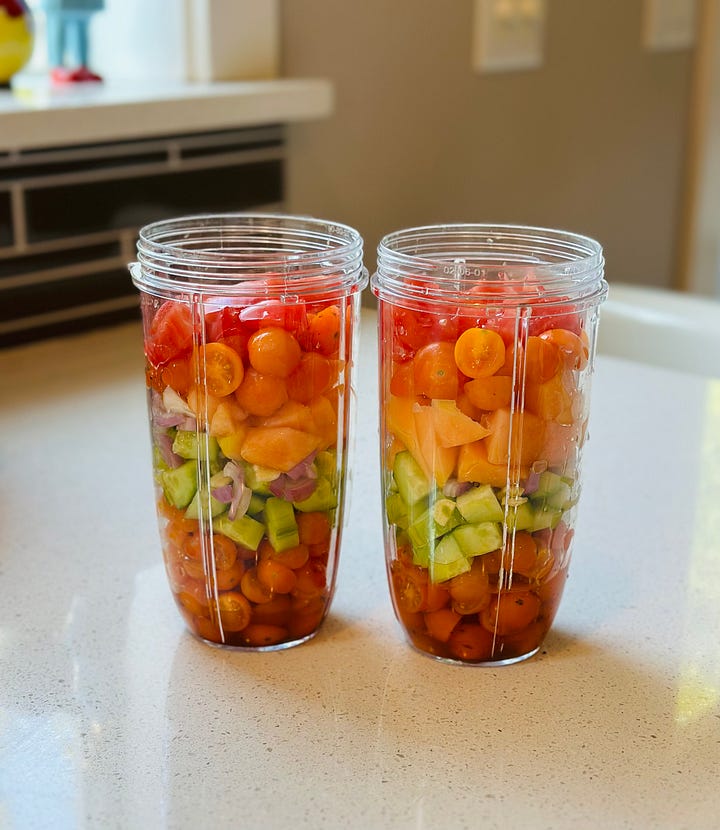
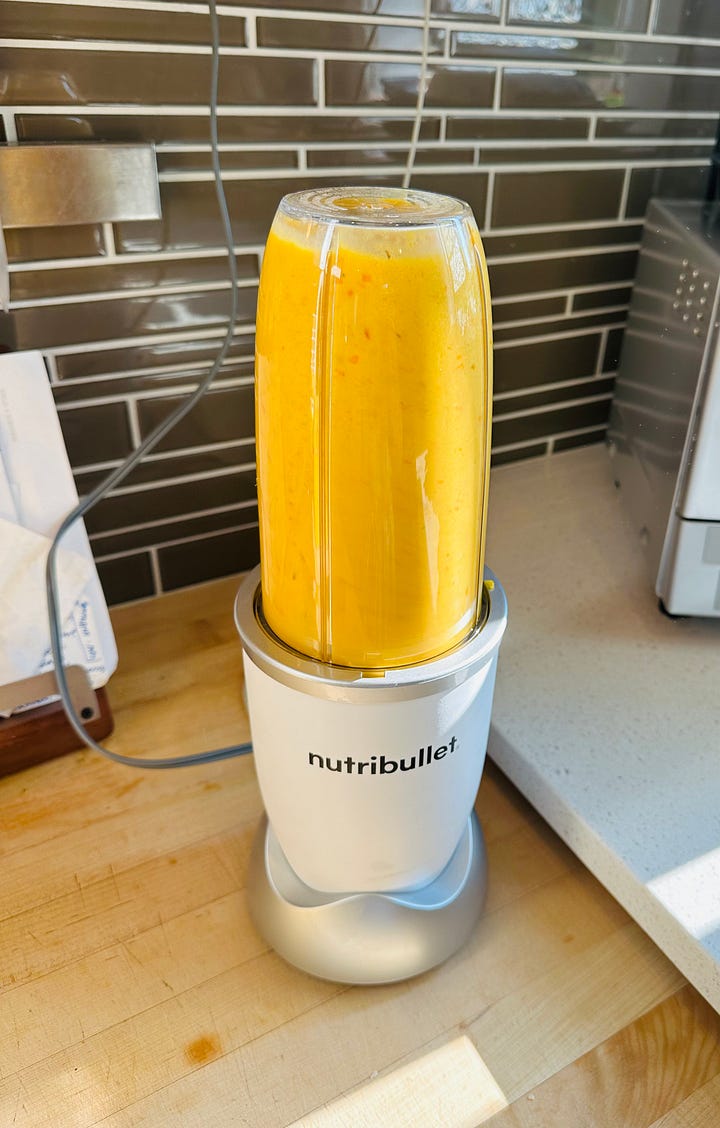
Is it possible to be sick of gazpacho? Even if your answer leans toward yes, you’ll change your mind after you make this Cantaloupe Gazpacho from the gorgeous new cookbook, LE SUD, by Rebekah Peppler and Joann Pai. What’s not to love? Bright flavors and gorgeous colors.
Cantaloupe Gazpacho - serves 4 - 6
2 pints golden cherry tomatoes
½ med, ripe cantaloupe, rind and seeds discarded and flesh chopped
2 small or 1 large seedless cucumbers, chopped
1 large shallot, chopped
2 garlic cloves
Flaky sea salt
2T sherry vinegar
¼c extra-virgin olive oil, plus more for serving
rough chopped parsley for garnish
In a large bowl, combine the tomatoes, melon, cucumbers, vinegar, olive oil, shallot, and garlic; season with salt. Toss to combine, then let sit at room temperature for 1 hour.
Transfer the mixture and any accumulated juices to a blender (as you can see from the image above, I use a bullet blender, which I bought when I thought I’d start drinking protein shakes, which I hate, but I love the blender!) and blend until smooth. Refrigerate until chilled, at least 1 hour and up to overnight (or serve immediately).
Ladle into bowls, drizzle a bit of olive oil and garnish with fresh parsley
Gazpacho will keep, stored in an airtight container in the refrigerator, for 3 to 4 days.
This soup is unbelievable!
Stanley’s gone fishing!
If you aren't on my mailing list, you can subscribe below. And, if you'd like to buy my books, you can do so here and here. To support the newsletter, please subscribe or upgrade to paid. Comment, like, and share with your funny and fun friends with the buttons below. When you do, I get an endorphin buzz.
Tell your people you love them, and take good care of your skin.








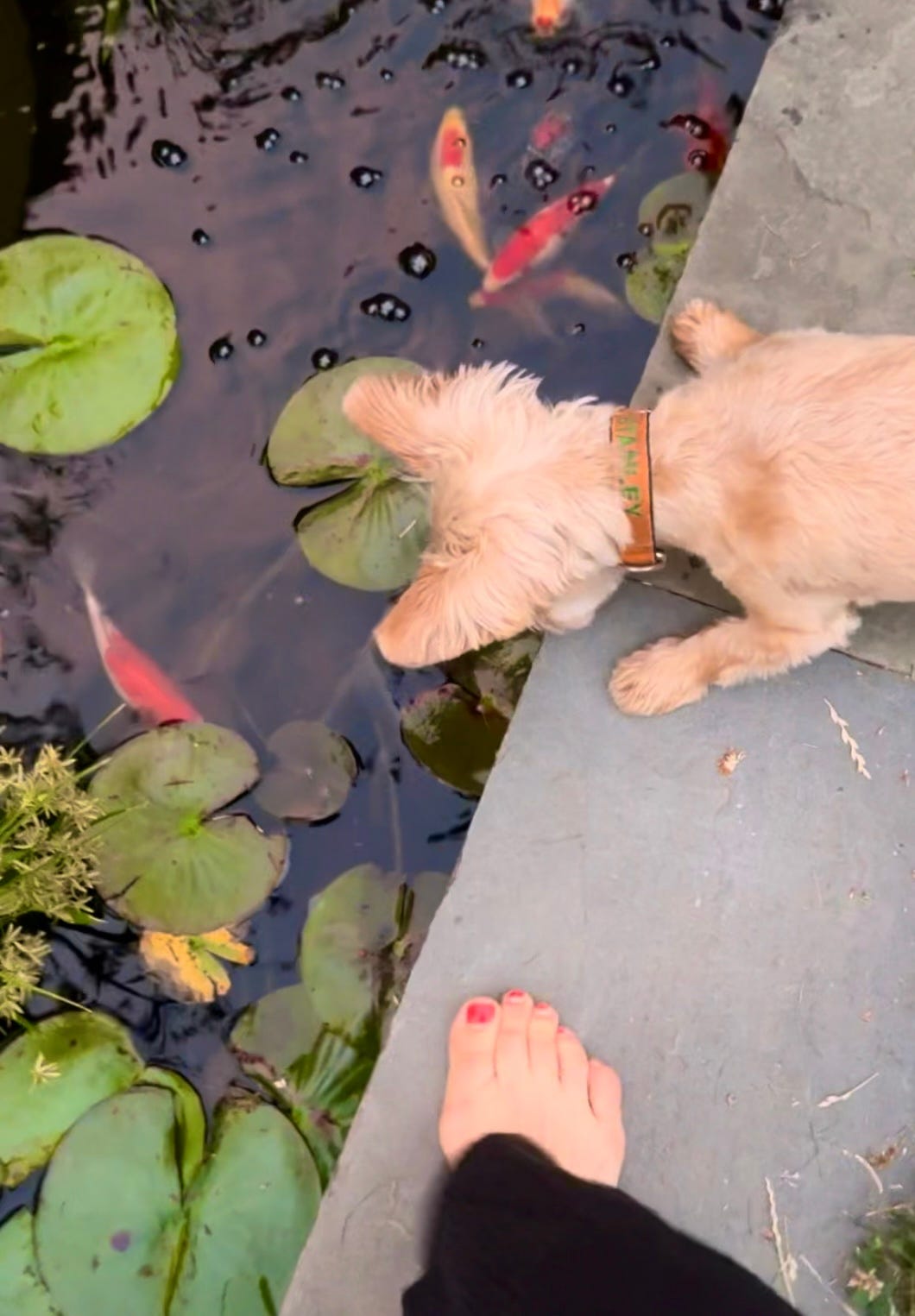
For my birthday I asked my husband to paint our dining room. 😍
I love that you are changing things up (although your newsletter always captivates me -- no matter what form it takes). My husband makes sure my bike tires are pumped up and ready to go before we head out to ride together. I make sure he always has clean workout clothes and towels for the gym. Also, I sometimes spring into bed at the end of a long day and tell him I love him. He laughs.